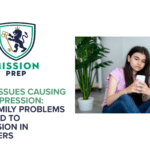Medication for Teens: Bupropion (Wellbutrin) and Teen Mental Health


A 2021 national survey found that nearly one in five U.S. teens between the ages of 12 and 17 had experienced major depression. Yet, more than half said they hadn’t received any treatment for it.¹ For a lot of families, the signs of depression may be either missed or dismissed until things feel unmanageable.
If you’re here, you’re aware that something serious is going on under the surface, which matters.
Some teens try a medication for depression or anxiety and feel better quickly. Others don’t. There might be side effects or progress that plateaus. When this happens, providers may recommend another type of antidepressant that works differently. Bupropion, often prescribed as “Wellbutrin,” is one of those options.
If you’re considering bupropion for your teen’s treatment, a mental health professional can talk you through whether this could be a suitable treatment option for your child’s symptoms and needs. This article can also work as a useful guide, as it discusses:
- What bupropion is
- When bupropion is used in teen mental health care
- The teen mental health conditions bupropion can help
- How bupropion can affect sleep, appetite, and behavior in teens
- The appropriate Wellbutrin dosage for adolescents
- Wellbutrin vs other antidepressants for teens
- What the risks of bupropion are for teens
- Steps for stopping Wellbutrin safely in teens
- Where to find professional medication guidance for teen mental health conditions

What Is Bupropion (Wellbutrin)?
Bupropion, also called “Wellbutrin,” is an NDRI (norepinephrine and dopamine reuptake inhibitor). It is not the starting point for most treatment plans, but is sometimes used in teen mental health treatment when other steps haven’t helped enough.
Most antidepressants used in teens increase serotonin. Bupropion doesn’t do this. Instead, it affects dopamine and norepinephrine, which play a role in energy, focus, and how motivated someone feels. If these systems are out of balance, things can slow down. It’s harder to concentrate, get moving, and feel much of anything.
What bupropion does is slow how quickly the chemicals dopamine and norepinephrine are cleared away in the brain. This gives the brain more time to use what it has. For teens who feel mentally foggy or drained, this change might help.
Wellbutrin side effects for teens are different from SSRIs (selective serotonin reuptake inhibitors). For instance, there’s typically less sedation and weight gain. Teens may feel more alert instead of more tired, which can make a difference, especially when fatigue is part of the problem.
When Is Bupropion Used in Teen Mental Health Care?
Bupropion for teenage mood regulation isn’t a typical first step. It’s brought in when the more commonly used medications haven’t helped enough – or when their side effects start to interfere with daily life. This includes issues like extreme fatigue, emotional flatness, or weight gain from SSRIs.
Sometimes bupropion is considered because of the teen’s symptoms. If they feel drained, struggle to concentrate, or seem mentally slowed down, serotonin-based medications may not be the right fit. Bupropion works on different systems, and for some teens, this change creates a positive shift.
Bupropion is also used when more than one issue is happening at once. A teen might be dealing with depression and attention problems, or a low mood mixed with anxiety. It isn’t a “cure-all” medication, but it affects enough systems in the brain to help with more than one thing at a time.
Dosing depends on the teen’s age, weight, and how their body has handled medication in the past. Most psychiatrists start low and go up gradually, checking for side effects along the way.
What Conditions Can Bupropion Help Treat in Teens?
Bupropion is sometimes used to treat more than depression. It works on brain systems tied to attention, energy, and motivation. This means it may help with other symptoms too.
For instance, some teens take bupropion when focus is a problem. Others, when anxiety is mixed in. In certain cases, it supports more than one issue at the same time.
It depends on what’s going on, what’s been tried already, and how the teen responds. Let’s cover how bupropion can help with certain mental health conditions in teens, including depression, ADHD, anxiety, and bipolar disorder.
Bupropion for Teenage Depression
Bupropion becomes an option when SSRIs haven’t worked or when the side effects have made things worse. Studies show bupropion is well tolerated for depression treatment.²
Bupropion may also be considered based on the type of symptoms experienced by a teen. For instance, some teens with depression don’t feel sad all the time. Instead, they may feel numb, tired, unmotivated, or checked out. If these are the main issues, bupropion might be a better fit than medications that only affect serotonin.
In clinical use, bupropion has shown potential to help with low mood, loss of interest, and difficulty following through on tasks.³ It may also improve energy and cognitive function in some teens. These changes don’t happen overnight, but they can give a teen more space to reconnect with things that matter.
Not every teen responds well to this bupropion, and it’s not right for every form of depression. But for the right symptoms, and when monitored carefully, it can be part of a well-rounded treatment plan.
Bupropion for ADHD in Teenagers
Bupropion isn’t a first-choice ADHD medication, but it’s sometimes used when stimulants haven’t worked well. For example, some teens lose too much weight on stimulants.⁴ Additionally, others may stop sleeping or feel jittery all day. And for some, the benefits just don’t last.
Bupropion affects dopamine and norepinephrine. This overlap means it could help with focus and attention, even though it works more gradually than other forms of ADHD medications.
It’s sometimes chosen when depression and ADHD are both at play. Using one medication to address both can make things simpler, especially if the teen already feels overwhelmed.
How Bupropion Works for Anxiety in Adolescents
Bupropion isn’t meant to treat anxiety on its own. Instead, it’s sometimes used when a teen has both depression and anxious thoughts happening at the same time. Not always, but in some cases, treating one helps the other.
As mentioned, Wellbutrin increases dopamine and norepinephrine. For some teens, this helps with increased energy and a little more mental clarity. Therefore, bupropion can take the edge off certain kinds of anxiety – especially the kind that comes with feeling “stuck” or slowed down.
But, depending on the teen, things can play out a little differently with this medication. In some teens, bupropion makes things worse. Restlessness may show up, thoughts can speed up, and the body might not settle.⁵
This is why the first few weeks matter when taking any new antidepressant. Side effects of bupropion on teen behavior can tell a healthcare team what’s working and what isn’t.
Using Bupropion to Treat Teenage Bipolar Disorder
Bupropion isn’t one of the more common medications used for teens with bipolar disorder. However, it is an option, usually when depressive symptoms feel heavy, and a mood stabilizer is already in place.
Bupropion works differently from many antidepressants. Because it doesn’t raise serotonin, it’s less likely to trigger manic episodes than some other options. This makes it a possible fit for bipolar depression, as long as there’s something else in the treatment plan for managing mood swings.
Bupropion isn’t used by itself in this situation. It’s added alongside other medications, like lithium or a second-generation antipsychotic, to support the depressive side of bipolar disorder without increasing risk.
When it’s used for teen bipolar disorder, bupropion dosing is usually low at the start. The clinical team monitors the teen closely for signs that energy is rising too fast or mood is shifting in a way that doesn’t match their life circumstances. If this starts to happen, changes are made quickly.
How Bupropion Affects Sleep, Appetite, and Behavior in Teens

Sleep Effects of Wellbutrin on Sleep in Adolescents
Bupropion doesn’t usually cause sedation. In fact, some teens feel more awake during the day, which can help when depression shows up as fatigue. But there are trade-offs. If the dose is too high or if it’s taken late in the day, falling asleep might become harder. When this happens, providers often suggest taking the dose earlier in the day or lowering it to see if sleep improves.
Wellbutrin and Appetite Changes in Teens
Appetite changes with bupropion tend to go in the opposite direction from that of SSRIs; it’s not linked to weight gain. In fact, some teens eat less than usual at the start. This can be helpful in some cases, but not always. If weight starts dropping quickly or meals are being skipped, this is something the care team will want to track.
Bupropion and Teen Behavior
Mental energy is often the behavior shift teens and parents notice first. Some teens may feel more focused. Others might feel like they can finally start tasks they’ve been avoiding. However, in a few cases, this uptick in energy can lead to irritability or restlessness. This restlessness usually shows up early on in treatment, especially if the dose is increased quickly. Regardless, any major change in mood or behavior needs a second look by a professional.
Wellbutrin Dosage for Adolescents
Most teens start on a low dose of Wellbutrin, often around 100 to 150 mg per day, depending on the formulation and the teen’s weight, age, and medical history. The dose may be increased slowly, usually once the care team knows how the teen is responding and whether any side effects show up.
There’s no one-size-fits-all dosage. Some teens do well on the starting dose. Others may need more, but changes are always made gradually, with close monitoring along the way.
Wellbutrin vs Other Antidepressants for Teens
Not every teen responds in the same way to the same type of medication. SSRIs are used for teen mental health conditions more often, especially when anxiety is part of the picture. But for teens with low energy, trouble concentrating, or side effects from serotonin-based meds, Wellbutrin offers a different path.
Bupropion may be a better fit for teens than other meds when motivation is low and focus is slipping – not just mood. It also tends to cause fewer issues with weight or sedation, which can be deciding factors for some families.
The difference isn’t about which medication is stronger or “better” overall. It’s about finding the right match for how a teen’s symptoms actually show up.
What Are the Risks of Bupropion in Teens?
Like any antidepressant, there are Wellbutrin side effects for teens. The following information covers the more relevant of these.
Bupropion Risk of Seizures in Teens
There’s a known seizure risk with bupropion. It stays low at normal doses, but goes up if the dose is too high or increased too fast. Teens with eating disorders or a history of past seizures are usually not prescribed this medication.
Medication Interactions
Bupropion doesn’t mix well with every medication. Stimulants, other antidepressants, and even caffeine might affect how it works. This is why the full treatment plan needs to be reviewed before starting.
Emotional Shifts
Some teens feel more irritable or restless early on in treatment with bupropion. In rare cases, bupropion can cause suicidal thinking, especially in the first few weeks. Any major mood or behavior changes should be brought up with your healthcare provider right away. If you’re concerned about a teen’s immediate safety and well-being, you may need to call 911 or take them to your nearest emergency department.
Stopping Wellbutrin Safely in Teens
Stopping Wellbutrin safely in teens requires a gradual approach. Stopping all at once can lead to withdrawal symptoms or a fast return of original symptoms. Even if things are going well, the brain still needs time to adjust. For instance, if a teen doesn’t taper the medication, they can get withdrawal symptoms such as the following.
Wellbutrin withdrawal symptoms:
- Dizziness
- Irritability
- Fogginess
- Headaches
- Mood swings
These symptoms usually pass with time, but tapering helps avoid them in the first place.
Mission Prep can help you set a plan to lower the dose over time. We can also check in to track how the teen is feeling during the process. If symptoms return or things feel off, the plan can be adjusted.
Get Support at Mission Prep: Teen Mental Health and Wellbutrin Medication Guidance
Figuring out the right medication for a teen can feel overwhelming. There’s a lot to weigh up; what’s worked, what hasn’t, what might help next – and how to know if medication is helping at all.
At Mission Prep, we take time to look at the full story, not just the symptoms. This includes family dynamics, school stress, daily patterns, and how your teen responds to treatment over time. If bupropion becomes part of the plan, you won’t have to guess your way through it. We’ll explain what to expect, how it’s monitored, and when to adjust.
If you’re ready for support that’s thoughtful and teen-centered, we’re here. Reach out to us at (866) 823-5443 to get started.

References
- Twenge, J. M., & Campbell, W. K. (2022). Depression and anxiety among US children and young adults, 2021. JAMA Network Open, 5(7), e2222557.
- https://jamanetwork.com/journals/jamanetworkopen/fullarticle/2824286#:~:text=A%20recent%20study5%20using%20data%20from%20the,mental%20health%20treatment%2C%20and%20rates%20varied%20greatly
- Kweon, K., & Kim, H.-W. (2019). Effectiveness and safety of bupropion in children and adolescents with depressive disorders: A retrospective chart review. Clinical Psychopharmacology and Neuroscience, 17(4), 537–541. https://pmc.ncbi.nlm.nih.gov/articles/PMC6852678
- National Alliance on Mental Illness. (2022). Medication fact sheet: Bupropion. https://www.nami.org/NAMI/media/NAMI-Media/Research/Bupropion.pdf
- Poulton, A., Briody, J., McCorquodale, T., Melzer, E., Herrmann, M., Baur, L. A., & Duque, G. (2012). Weight loss on stimulant medication: How does it affect body composition and bone metabolism? International Journal of Pediatric Endocrinology, 2012(1), 30. https://pmc.ncbi.nlm.nih.gov/articles/PMC3549744/
- Stahl, S. M. (2018). Bupropion. In Prescriber’s guide – Children and adolescents (pp. 83–96). Cambridge University Press. https://www.cambridge.org/core/books/abs/prescribers-guide-children-and-adolescents/bupropion/1603FB2F72F16F527F173DA026532FF6



















